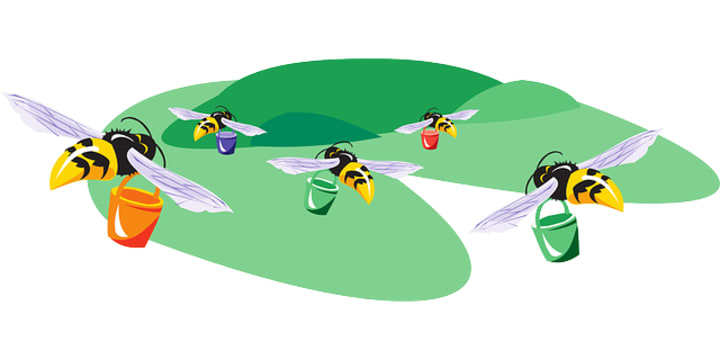Confessions of a Disabled Job-Seeker: The One with the Bee
A Story

Flight
It has often been said that bumblebees defy aerodynamics and should not be able to fly. However, a recent study showed how the tiny wings keep the bee in the air. The study, published in the journal Proceedings of the National Academy of Sciences in 2005, used high-speed photography to show that bumblebees flap their wings back and forth rather than up and down.
Michael Dickinson, a professor of biology and insect flight expert at the University of Washington, explained to Live Science in a 2011 article that the wing movement is rather like the partial spin of a helicopter propeller and the angle of the wings crate tiny vortices in the air—like tiny hurricanes which help keep the bee up in the air.
Does a Bumblebee exceed our expectations simply by being able to fly?
When the size of the tiny wings and the size of that fluffy bumblebee butt are examined, you wonder how it's possible for such tiny wings to carry such a fluffy butt in the air, right? A regular human who hadn't seen a bumblebee in flight would say it can't be done.
But it can fly, and very well too. Its wee bumble bee wings may not work the same way as other bees, but they still work. The fuzzy-butted Bumblebee has no understanding of the human expectations of it, or lack of them—and proceeds to fly around regardless, doing its pollen-collection job and in a beautiful workplace too!The Bumblebee doesn't exceed it owns expectations because it is just carrying on with its daily routine. The humans though, are blown away! This wee insect is a flying marvel—it has exceeded their expectations.
In this scenario—which set of expectations are correct?

Now: Swap the bumblebee in the scenario for a disabled person...
Let's try another scenario where we replace the Bee with a disabled person. A disabled person understands their condition and limitations as well as what they are capable of, both in life and in the workplace. A disabled applicant wants to work and have a routine just as much as a non-disabled person does. Once in a working routine, I tend to set myself quite high standards and have quite high expectations for myself but that is in my nature.If I am going to do something, do it right, make it worth my time.
Since becoming sick, and now disabled, I am adjusting and finding that I have more resilience than expected and more determination than many people I know to make a positive contribution in the workplace. The grieving process for the parts of my life which have been taken away by illness is currently still ongoing, but I am finding that the expectations I have for my own contribution to the workplace, any workplace, seem far higher than those held by recruiters and employers—am I in the same situation as the wee Bumblebee?
Like the bumblebee, I happily carry out my daily routine, my new one is slower and allows me to spend more time on things I enjoy and doing voluntary work proved to me that I CAN still make a contribution; but unlike the bumblebee I am acutely aware of the disapproval or negative attitudes towards a disabled applicant who has the audacity to turn up for a job interview when I would be working in view of customers and the general public, actually be seen there, looking disabled...
Don't I have the right to paid employment too? The same as non-disabled people?
Recruiters and prospective employers' expectations of an applicant immediately drop in the exact moment they find out this applicant is disabled—and that's before they even find out what the disability is or if it will actually affect the tasks required to carry out the job advertised. If expectations were a bag of bricks you'd hear it hitting the ground from miles away!In every job-seeking situation I carefully assess the workplace accessibility, tasks required, possible commute plans, and the employers HR/Equal Opportunity policy BEFORE making the application for an interview. But that dreaded 'D' word seems to make the comprehension of my experience, training and references impossible. The employer expectations are that a disabled person cannot work as well as an able-bodied person. What utter bollocks. Surely in todays' benefit street society, the fact that we want to work already gives us a better work ethic than most!
Getting an interview is a struggle against discriminatory attitudes.

Bees in their 'workplace'.
My expectation is to be considered as an equal in the workplace. The employers expectation is that I cannot offer anything to the normal workplace because I am disabled. I should not have to prove them wrong to make a valid point. Legislation states that I do not have to disclose a disability unless it will affect anything in the interview process, yet if I declare a disability I am refused the interviews, even though employers are meant to provide the interviews in line with their equal opportunities policy, as long as the disability wont affect the ability of the worker to do the job advertised... and don't even get me started on asking about "reasonable adjustments." That term seems to be a swear-word at interviews.
If I keep quiet about being disabled (and I always get invited to an interview if I do this), I am treated as though I have somehow attempted to trick the employer into taking me, that I have deliberately manipulated 'the system' to force them to interview me. They simply see the disability and not what I can offer as an employee.
"Inclusion." Do employers actually know what this means or is the word just used for good PR?

My expectations are changing—I am now expecting the recruiter to discriminate. I have deliberately not clicked the box in the 'optional' equalities part of the application form in two recent job applications, and when pulled-up for it in an accusing manner (not just asked about it) when I arrive for my interview I have explained that I do not tick the 'optional' part because I get discriminated against and refused interviews because I am disabled. I am treated with mistrust... over an OPTIONAL part of an application form for jobs with companies who claim to work with an EQUAL OPPORTUNITIES POLICY.
When I have made duplicate applications where I disclose disability in one application and don't admit to it in the one, I only get invited to an interview for the application where I DON'T admit that I am disabled. Therefore I have to conclude that I am screened out of the interview selection process because I ticked the disabled box on the form. Hence, I have been screened out for being disabled.
Whose expectations are unrealistic in the disabled worker scenario?
Thought-provoking, isn't it?
Conclusion
I wanna be a Bumblebee! I want to carry on with my daily routine and do it without awareness of negativity and the unrealistically low expectations of other people. Is that wrong?
About the Creator
Rosalyn Grams
#walking on wonky kneesI write about journeys,imaginary worlds, disability challenges, satire & other topics. Twitter @rosgrams Email [email protected] Facebook https://www.facebook.com/walkingonwonkyknees/






Comments
There are no comments for this story
Be the first to respond and start the conversation.